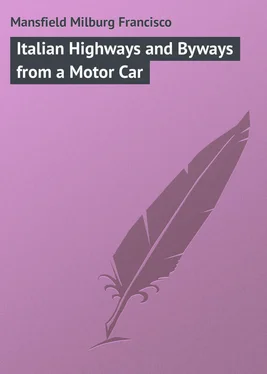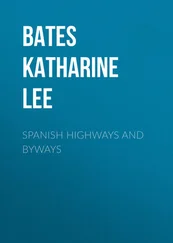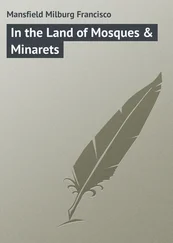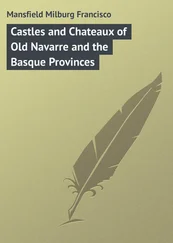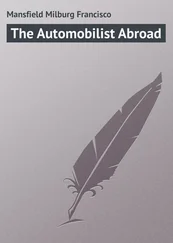Milburg Mansfield - Italian Highways and Byways from a Motor Car
Здесь есть возможность читать онлайн «Milburg Mansfield - Italian Highways and Byways from a Motor Car» — ознакомительный отрывок электронной книги совершенно бесплатно, а после прочтения отрывка купить полную версию. В некоторых случаях можно слушать аудио, скачать через торрент в формате fb2 и присутствует краткое содержание. Жанр: foreign_prose, Путешествия и география, на английском языке. Описание произведения, (предисловие) а так же отзывы посетителей доступны на портале библиотеки ЛибКат.
- Название:Italian Highways and Byways from a Motor Car
- Автор:
- Жанр:
- Год:неизвестен
- ISBN:нет данных
- Рейтинг книги:3 / 5. Голосов: 1
-
Избранное:Добавить в избранное
- Отзывы:
-
Ваша оценка:
- 60
- 1
- 2
- 3
- 4
- 5
Italian Highways and Byways from a Motor Car: краткое содержание, описание и аннотация
Предлагаем к чтению аннотацию, описание, краткое содержание или предисловие (зависит от того, что написал сам автор книги «Italian Highways and Byways from a Motor Car»). Если вы не нашли необходимую информацию о книге — напишите в комментариях, мы постараемся отыскать её.
Italian Highways and Byways from a Motor Car — читать онлайн ознакомительный отрывок
Ниже представлен текст книги, разбитый по страницам. Система сохранения места последней прочитанной страницы, позволяет с удобством читать онлайн бесплатно книгу «Italian Highways and Byways from a Motor Car», без необходимости каждый раз заново искать на чём Вы остановились. Поставьте закладку, и сможете в любой момент перейти на страницу, на которой закончили чтение.
Интервал:
Закладка:
What you don’t find in the small Italian hotels are baths, nor in many large ones either. When you do find a baignoir in Europe (except those of the very latest fashion) it is a poor, shallow affair with a plug that pulls up to let the water out, but with no means of getting it in except to pour it in from buckets. This is a fault, sure enough, and it’s not the American’s idea of a bath tub at all, though it seems to suit well enough the Englishman en tour.
France is, undoubtedly, the land of good cooks par excellence , but the Italian of all ranks is more of a gourmet than he is usually accounted. There may be some of his tribe that live on bread and cheese, but if he isn’t outrageously poor he usually eats well, devotes much time to the preparing and cooking of his meals, and considerably more to the eating of them. The Italian’s cooking utensils are many and varied and above all picturesque, and his table ware invariably well conditioned and cleanly. Let this opinion (one man’s only, again let it be remembered) be recorded as a protest against the universally condemned dirty Italian, who supposedly eats cats and dogs, as the Chinaman supposedly eats rats and mice. We are not above reproach ourselves; we eat mushrooms, frog legs and some other things besides which are certainly not cleanly or healthful.
More than one Italian inn owes its present day prosperity to the travel by road which frequently stops before its doors. Twenty-five years ago, indeed much less, the vetturino deposited his load of sentimental travellers, accompanied perhaps by a courier, at many a miserable wayside osteria , which fell far short of what it should be. To-day this has all changed for the better.
Tourists of all nationalities and all ranks make Italy their playground to-day, as indeed they have for generations. There is no diminution in their numbers. English minor dignitaries of the church jostle Pa and Ma and the girls from the Far West, and Germans, fiercely and wondrously clad, peer around corners and across lagoons with field glasses of a size and power suited to a Polar Expedition. Everybody is “doing” everything, as though their very lives depended upon their absorbing as much as possible of local colour, and that as speedily as possible. It will all be down in the bill, and they mean to have what they are paying for. This is one phase of Italian travel that is unlovely, but it is the phase that one sees in the great tourist hotels and in the chief tourist cities, not elsewhere.
To best know Italian fare as also Italian manners and customs, one must avoid the restaurants and trattoria asterisked by Baedeker and search others out for himself; they will most likely be as good, much cheaper, more characteristic of the country and one will not be eternally pestered to eat beefsteak, ham and saurkraut, or to drink paleale or whiskey. Instead, he will get macaroni in all shapes and sizes, and tomato sauce and cheese over everything, to say nothing of rice, artichokes and onions now and again, and oil, of the olive brand, in nearly every plat . If you don’t like these things, of course, there is no need going where they are. Stick to the beefsteak and paleale then! Romantic, sentimental Italy is disappearing, the Italians are becoming practical and matter of fact; it is only those with memories of Browning, Byron, Shelley, Leopold Robert and Boeklin that would have Italy sentimental anyway.
Maximilien Mission, a Protestant refugee from France in 1688, had something to say of the inns at Venice, which is interesting reading to-day. He says: – “There are some good inns at Venice; the ‘Louvre,’ the ‘White Lyon,’ the ‘Arms of France;’ the first entertains you for eight livres (lire) per day, the other two somewhat cheaper, but you must always remember to bargain for everything that you have. A gondola costs something less than a livre (lire) an hour, or for a superior looking craft seven or eight livres a day.”
This is about the price of the Venetian water craft when hired to-day, two centuries and more after. The hotel prices too are about what one pays to-day in the smaller inns of the cities and in those of the towns. All over Italy, even on the shores of the Bay of Naples, crowded as they are with tourists of all nationalities and all ranks, one finds isolated little Italian inns, backed up against a hillside or crowning some rocky promontory, where one may live in peace and plenitude for six or seven francs a day. And one is not condemned to eating only the national macaroni either. Frankly, the Neapolitan restaurateur often scruples as much to put macaroni before his stranger guests as does the Bavarian inn-keeper to offer sausage at each repast. Some of us regret that this is so, but since macaroni in some form or other can always be had in Italy, and sausages in Germany, for the asking, no great inconvenience is caused.
Macaroni is the national dish of Italy, and very good it is too, though by no means does one have to live off it as many suppose. Notwithstanding, macaroni goes with Italy, as do crackers with cheese. There are more shapes and sizes of macaroni than there are beggars in Naples.
The long, hollow pipe stem, known as Neapolitan, and the vermicelli, which isn’t hollow, but is as long as a shoe string, are the leading varieties. Tiny grains, stars, letters of the alphabet and extraordinary animals that never came out of any ark are also fashioned out of the same pasta , or again you get it in sheets as big as a good sized handkerchief, or in piping of a diameter of an inch, or more.
The Romans kneaded their flour by means of a stone cylinder called a maccaro . The name macaroni is supposed to have been derived from this origin.
Naples is the centre of the macaroni industry, but it is made all over the world. That made in Brooklyn would be as good as that made in Naples if it was made of Russian wheat instead of that from Dakota. As it is now made it is decidedly inferior to the Italian variety. By contrast, that made in Tunis is as good as the Naples variety. Russian wheat again!
A macaroni factory looks, from the outside, like a place devoted to making rope. Inside it feels like an inferno. It doesn’t pay to get too well acquainted with the process of making macaroni.
The flour paste is run out of little tubes, or rolled out by big rollers, or cut out by little dies, thus taking its desired forms. The long, stringy macaroni is taken outside and hung up to dry like clothes on a line, except that it is hung on poles. The workmen are lightly and innocently clad, and the workshops themselves are kept at as high a temperature as the stoke-room of a liner. Whether this is really necessary or not, the writer does not know, but he feels sure that some genius will, some day, evolve a process which will do away with hand labour in the making of macaroni. It will be mixed by machinery, baked by electricity and loaded up on cars and steamships by the same power.
The street macaroni merchants of Naples sell the long ropy kind to all comers, and at a very small price one can get a “filling” meal. You get it served on a dish, but without knives, forks or chop sticks. You eat it with your fingers and your mouth.
The meat is tough in Italy, often enough. There is no doubt about that. But it is usually a great deal better than it is given credit for being. The day is past, if it ever existed, when the Anglo-Saxon traveller was forced to quit Italy “because he could not live without good meat.” This was the classic complaint of the innocents abroad of other days, whether they hailed from Kensington or Kalamazoo. They should never have left those superlatively excellent places. The food and Mazzini were the sole topics of travel talk once, but to-day it is more a question of whether one can get his railway connection at some hitherto unheard of little junction, or whether the road via this river valley or that mountain pass is as good as the main road. These are the things that really matter to the traveller, not whether he has got to sleep in a four poster in a bedroom with a tile or marble floor, or eat macaroni and ravioli when he might have – if he were at home – his beloved “ham” and blood-red beefsteaks.
Читать дальшеИнтервал:
Закладка:
Похожие книги на «Italian Highways and Byways from a Motor Car»
Представляем Вашему вниманию похожие книги на «Italian Highways and Byways from a Motor Car» списком для выбора. Мы отобрали схожую по названию и смыслу литературу в надежде предоставить читателям больше вариантов отыскать новые, интересные, ещё непрочитанные произведения.
Обсуждение, отзывы о книге «Italian Highways and Byways from a Motor Car» и просто собственные мнения читателей. Оставьте ваши комментарии, напишите, что Вы думаете о произведении, его смысле или главных героях. Укажите что конкретно понравилось, а что нет, и почему Вы так считаете.
